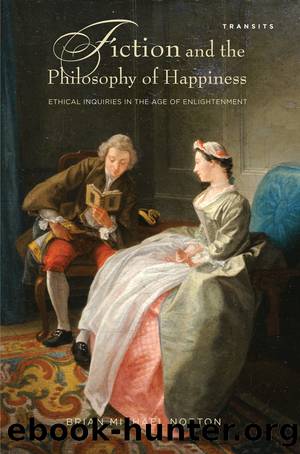Fiction and the Philosophy of Happiness by Norton Brian Michael;

Author:Norton, Brian Michael; [Norton, Brian Michael]
Language: eng
Format: epub
Publisher: Bucknell University Press
Published: 2012-08-15T00:00:00+00:00
III
The second half of Julie provides a very different look at the problem of happiness. In the first half of the novel, where the obligations of communal life prevent Julie and St. Preux from following their natural penchants, the protagonists experience a kind of moral self-division that makes happiness impossible whichever way they decide. But if it is society that creates these âcontradictionsââand this is one of the few issues in the literature on Rousseau where there is some consensusâperhaps a community could be designed in such a way that these conflicts never arise. Clarens is Rousseauâs attempt to imagine such a communityânot on the level of the state or city-state, as in his republican writings, but on the level of the patriarchal family.
Rousseauâs program in the second half of the novel is prepared for by Julieâs marriage to Monsieur de Wolmar at the end of part 3. Julie, who had been thinking about St. Preux even as she readied herself for the wedding, experiences a âsudden revolutionâ when she enters the church (292). The cause appears supernatural. âI thought I saw the instrument of providence and heard the voice of God in the ministerâs grave recitation of the holy liturgyâ (291). The changes this brings about in Julie are profound and far-reaching: âIt was as if an unknown power repaired all at once the disorder of my affections and re-established them in accordance with the law of duty and natureâ (292). The values that had been in conflict in the first half of the novel are now miraculously put back into order. Social duty and natural affection, no longer representing opposing moral systems, are now united under a common law. The shift marks a new beginning, in terms of both plot and Julieâs own character. As Julie declares, âI seemed to feel myself being rebornâ (293).
But it is not enough to be personally reordered. Society, which is constitutive of the contradictions that had made happiness impossible in the first place, must also be reordered. In fact, from the moment of Julieâs âfelicitous revolution,â as she alternatively calls it, society begins to take on an increased value in the novelâs moral imagination. In stark contrast to the âprejudicesâ of the dâÃtange regime and the artificiality of Parisian life, society is now a moral source in its own right. âI will be faithful,â the new Julie declares, âbecause that is the first duty which binds the family and all of societyâ (294). Indeed, marriage itself is no longer seen primarily as an affair of the heart but in terms of social duty. âOne does not marry in order to think solely about each other, but in order to fulfill conjointly the duties of civil lifeâ (306).45
Clarens represents this ideally reordered society. Everything in Clarens is thought out, from the architecture and landscaping to the domestic economy and gender relations, from modes of production to forms of recreation. Clarens is designed, above all, to reconcile the interests of the individual with the interests of the community as a whole.
Download
This site does not store any files on its server. We only index and link to content provided by other sites. Please contact the content providers to delete copyright contents if any and email us, we'll remove relevant links or contents immediately.
Women and Jewish Marriage Negotiations in Early Modern Italy by Howard Tzvi Adelman(380)
Warrior King by Wilbur Smith(316)
18 real-life stories of serial killers and murderers with solved and unsolved killings from the USA, UK, Europe, and beyond. by Ben Oakley(264)
Who's Who in the Zulu War, 1879: The British by Adrian Greaves Ian Knight(252)
Violence and Emotions in Early Modern Europe by Susan Broomhall;Sarah Finn;(236)
The Battle of Austerlitz by 50minutes(228)
The American Crisis by Unknown(220)
The Seeker by S. G. MacLean(202)
The Dutch East India Company and British East India Company: The History and Legacy of the Worldâs Most Famous Colonial Trade Companies by Charles River Editors(199)
The Origins of French Absolutism, 1598-1661 by Alan James(198)
Invisible Worlds by Peter Marshall(183)
The Traitor of Colditz by Robert Verkaik(182)
A Genius for Confusion by Richard M. Fried(181)
The Slave Trade in Africa by Simon Webb;(177)
Fires of Faith by Catholic England under Mary Tudor(176)
Interest and Connection in the Eighteenth Century by Jacob Sider Jost(175)
The Opium Wars: Exploring the Addiction of Empires from Beginning to End by Ramos Adrian & Compacted History(174)
The Thirty Years War â Complete by Friedrich Schiller(174)
Islam and the Trajectory of Globalization by Louay M. Safi(172)
